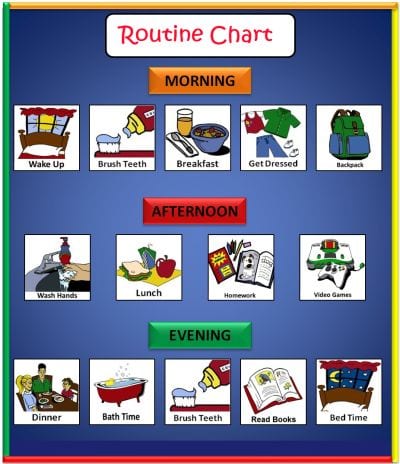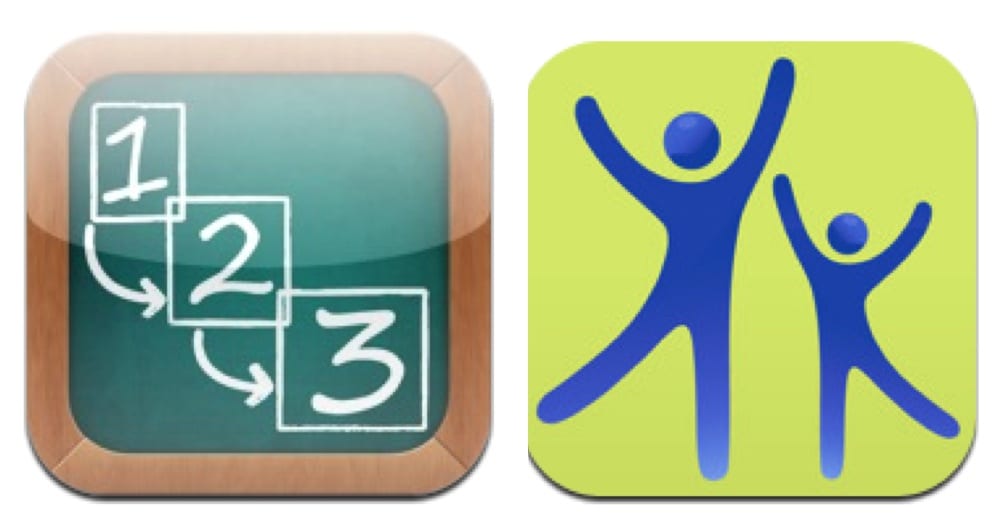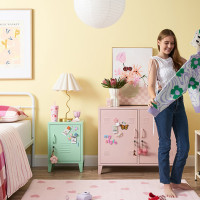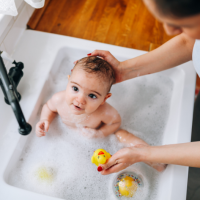Chaotic mornings, afternoon meltdowns and bedtime arguments…sound familiar?
For kids with special needs, transitions from one part of the day to another can be particularly trying, and when everyone is tired, hungry or in a hurry, emotions can run high.
So how can you, as a busy parent, meet your child’s needs in a way that will keep everyone calm?
The answer is having routines because kids thrive in a predictable environment.
Just as you have processes and procedures that streamline your life at work, predictable routines make life easier for kids at home.
If you don’t like having surprises sprung on you, then chance are your special needs child (well, any child really) doesn’t appreciate it either!
Kids cope better when they know what to expect.
You can set your child up for success every day by using a variety of techniques that will help your child to be more certain and less susceptible to emotional overload.
5 top tips for creating routines for special needs kids:
1. Create a visual timetable
Young children and those with special needs such as autism, Down Syndrome, language and other developmental delays find this visual approach very helpful. You can use free resources like clip art or google images to make it easy for your child to predict when activities like shopping, going to kindy, afternoon tea and rest time will take place. Another great tip is to laminate your pictures so that they’ll wear well, and then stick Velcro dots on the back. This will enable you to make an easy chart and as each activity is completed, your child will enjoy putting the picture in a ‘finished’ box. This helps kids get closure on one activity and helps them to move on to the next.
2. Use Apps to create a portable visual schedule
Who knew that your phone could enhance your child’s emotional resilience? Apps like First Then Visual Schedule and Model Me Going Places are a great way to help children to understand what is happening next, and the best thing about apps is that they’re usually cheap, instant and you can use them wherever you are.
3. Use a white board
For children who can read, it is helpful to have a simple daily schedule that they can refer to and tick off as each task is completed.
Morning routines might consist of very specific behaviours like:
Put my uniform on
Eat my cereal and drink my juice
Wash my teeth
Pack my school bag
Get into the car at 8.15am
Afternoon routines can be organised in a similar way. Remember, many kids find it hard to keep it together during a long day at school and by the time they get home can be very tense and wound up. If you want to keep your household’s emotional temperature down in the hours between home time and bed time, make your expectations clear and keep it simple.
4. Share your routines with people who care for your child.
One easy way to stress special needs kids out is to force them to do the same thing in different ways. You can avoid your child’s confusion by looking for ways to maintain the routines you use at home in your child’s preschool or long day care centre. Talk to staff there about what works for your child and provide them with the tools they need, such as a copy of your visuals or information about the apps you use at home. Chances are that your child, and perhaps others in the centre, will benefit from your combined approach.
5. Stop talking
It might sound strange, but international research suggests that we adults overload children with too much talk. If you (like me) are a ‘traffic cop’ kind of mum who is always giving directions and ensuring that compliance has been achieved, why not ease up a little and lessen your child’s language load? Special needs kids can find it particularly hard to process multiple instructions, so slow down, support them with visuals and use a low vocal tone so that you don’t escalate their emotions further.
How do you help your child stay organised and understand what’s coming next? Here’s a great place to share your ideas with other mums!























11:06 pm
11:05 pm
10:09 am
10:12 pm
5:05 pm
5:03 pm
6:26 pm
1:44 pm
1:29 pm
12:57 pm
9:51 pm
10:46 am
2:35 am
10:52 am
3:23 pm
3:21 pm
9:20 pm
10:28 pm
2:54 pm
1:24 pm
- «
- 1
- …
- 3
- 4
- 5
- »
Post a commentTo post a review/comment please join us or login so we can allocate your points.